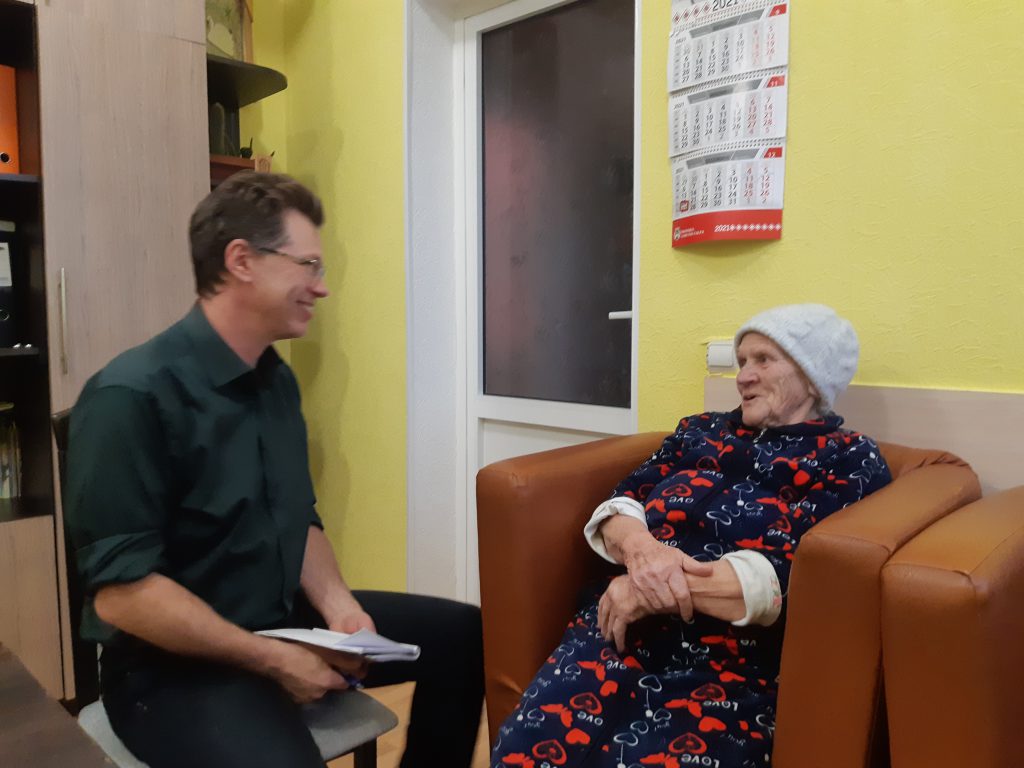The final interviews: residential care in Moldova
This project is coming to an end. In order to fully understand Moldova’s elderly care, I visited a residential care home in a village in the estern part of the country. Interviews were carried out with a number of residents, aged between just under 60 and over 90.

Residential care is a complicated part of the Moldovan elderly care. Principally, residency is granted only to people who pay for themselves, or who have relatives that pay for them. In all other cases, the process of ageing takes place in each person’s home. There are, however, exceptions. Occasionally, residency will be granted to a person of age whose condition urgently calls for a more permanent form of support than may be offered by home care which, as has been highlighted in previous posts, typically arrives every second day. Such exceptions also require the existance of a free slot, which is becoming rarer as Moldova’s population ages far quicker than the number of residential care places increases.
Residents typically pay 60% of their pension as a fee for a place in a residential care home. Residency includes a bed in a shared room – the room may contain from two to six beds, or even more, and is gender separated. Residency also grants access to a dining room, where cooked meals are offered several times a day. At this particular home, the cook took great pride in serving well-cooked, healthy food which is also offered to staff. I had a lunch together with a group of employees and the food quality was indeed very high. Residents are said to “always put on weight”, according to staff.
Apart from a bed in a shared sleeping room and access to the dining hall, there is a communal area with books, games, a TV-set, as well as some smaller rooms with gym, bathroom and hobby area. When outdoor temperatures permit (which they do about nine months per year in Moldova), residents spend most of their daytime hours outdoors. This center has a garden, some alotment for agriculture, outdoor furniture, a grill, etc.
Interviews and observations brought forward a couple of recurring themes. Firstly, residents consider themselves happy to have arrived at this particular home, which is considered a very good one. They also expressed huge gratitude for not living alone, in their own house, anymore. Being left alone in an otherwise empty house was frequently describes in terms of a disaster, a terrible fate.
Secondly, the power balance between staff and residents appeared quite patronising. Residents were simply told to participate in interviews, although several of them showed hesitation (and I reacted by asking the staff to ask another resident). Staff described residents in terms of “child-like” individuals, persons that need a lot of attention, confirmation, moral support – but with very low own agency. It was clear that being part of the staff means to know what should be done, and being a resident means to accept things as they are, and relax and be peaceful. Staff repeatedly underlined that a large part of their job consists of showing warmth, consideration, emotional proximity, reliability, and build trust. These and similar terms have been repeated also by home care staff that I have interviewed during the previous weeks.
Since my thesis will not focus on residential care, I will not bring a comparison with Swedish residential care into this post. However, several findings during this visit align with what I have found and reflected about in the home care interviews and observation. One thing diverges quite abruptly: the sheer horror with which the residential care interviewees described the lonelyness of an old person living in their own home.
With this post, the academic part of this blogg is coming to an end. A suggestion for future collaboration between students & professors in Moldova and Sweden will be the theme of the last post – stay tuned for that, and please leave a comment below this one.
Glenn Möllergren
